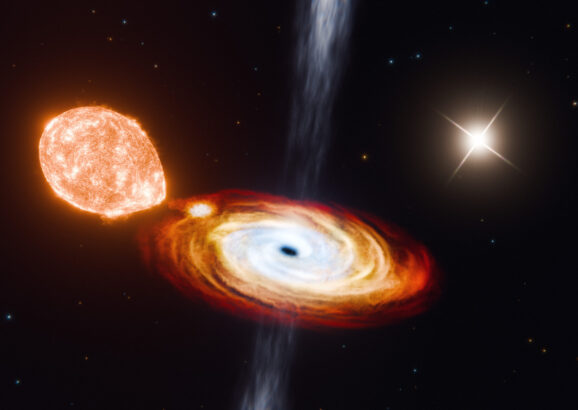Kevin Burdge '15
Research Interests
Kevin Burdge is an observational astrophysicist focused on discovering and characterizing compact binary systems—pairs of stellar remnants such as white dwarfs, neutron stars, and black holes. These systems provide exceptional laboratories for exploring compact-object physics, accretion processes, stellar evolution, and explosive cosmic events, including Type Ia supernovae.
His research leverages next-generation observatories, including the Vera Rubin Observatory, the Nancy Grace Roman Space Telescope, and the upcoming Laser Interferometer Space Antenna (LISA), to discover and study large, diverse populations of compact binaries. By combining gravitational-wave detections with multi-wavelength electromagnetic observations, Burdge and his group aim to understand how these systems form, evolve, and influence their cosmic environments. His team has significantly expanded the known population of gravitational-wave sources detectable by LISA, identifying rare binary systems and exotic merger remnants that offer unique opportunities to test general relativity and models of binary evolution. This discovery-driven work is supported by innovative GPU-based algorithms developed by his group.
Burdge has also used Gaia astrometry to discover the first known black hole in a triple-star system and maintains a strong interest in X-ray binary systems. Additionally, he develops specialized astronomical instrumentation, such as the ultrafast “Lightspeed” camera for the Magellan telescopes, enabling rapid photometric studies of faint, fast astrophysical phenomena. He is pioneering time-domain research with the James Webb Space Telescope, investigating dense stellar environments like globular clusters and the Galactic center to uncover hidden populations of compact binaries. Burdge is a member of the science team for the Advanced X-ray Imaging Satellite (AXIS), where he led the design of a proposed Galactic-plane survey expected to reveal over a million new X-ray sources.
Biographical Sketch
Kevin Burdge is an Assistant Professor of Physics at the Massachusetts Institute of Technology. He is an observational astrophysicist whose research focuses on compact stellar binaries, gravitational-wave astrophysics, and the development of advanced astronomical instrumentation for the Magellan telescopes. He actively contributes to major astrophysics collaborations, serving as a member of the LISA gravitational-wave Consortium and the AXIS Science Team.
Kevin, a first-generation college graduate, grew up in Heidelberg, Germany, as part of the U.S. military community stationed there. In 2010, following an internship at the Max Planck Institute for Nuclear Physics, he participated in the Research Science Institute at MIT, conducting research under the mentorship of MIT Physics Professor Hong Liu. Inspired by this formative experience, he pursued undergraduate studies at MIT, earning his B.S. in Physics in 2015. At MIT, Kevin discovered a passion for experimental physics through his experience in Junior Lab with Professors David Pritchard and Christoph Paus, and he completed his senior thesis under Professor Peter Fisher.
In 2015, Kevin began his Ph.D. studies in Physics at the California Institute of Technology. Initially focused on quantum optics, his interests shifted decisively to astrophysics, influenced by coursework in stellar astrophysics. He completed his doctorate in 2021 under the supervision of Professor Tom Prince, collaborating closely with Professors Jim Fuller and Shri Kulkarni.
Upon completing his Ph.D., Kevin returned to MIT as a Pappalardo Postdoctoral Fellow from 2021 to 2024, subsequently serving as a Postdoctoral Associate until joining the MIT faculty in July 2025.
Beyond research, Kevin is deeply committed to science outreach and education. He regularly speaks at events such as the Cambridge Science Festival and has dedicated over a decade as a judge and speaker for the European regional event of the Junior Science and Humanities Symposium.
Other important links:

Physicists discover first “black hole triple”
System observed 8,000 light-years away may be the first direct evidence of “gentle” black hole formation.
Awards & Honors
- 2021 // Pappalardo Fellowship, MIT
Key Publications
-
Burdge, K.B., El-Badry, K., Kara, E. et al. 2024, Nature, 635, 316, “The black hole low mass X-ray binary V404 Cygni is part of a wide triple.”
-
Burdge, K.B., El-Badry, K., Marsh, T.R. et al. 2022, Nature, 610, 467, “A dense 0.1-solar-mass star in a 51-minute-orbital-period eclipsing binary.”
-
Burdge, K.B., Marsh, T.R., Fuller, J. et al. 2022, Nature, 605, 41, “A 62-minute orbital period black widow binary in a wide hierarchical triple.”
-
Burdge, K. B., Coughlin, M. W., Fuller, J., et al. 2019, Nature, 571, 528, “General relativistic orbital decay in a seven-minute-orbital-period eclipsing binary system.”
